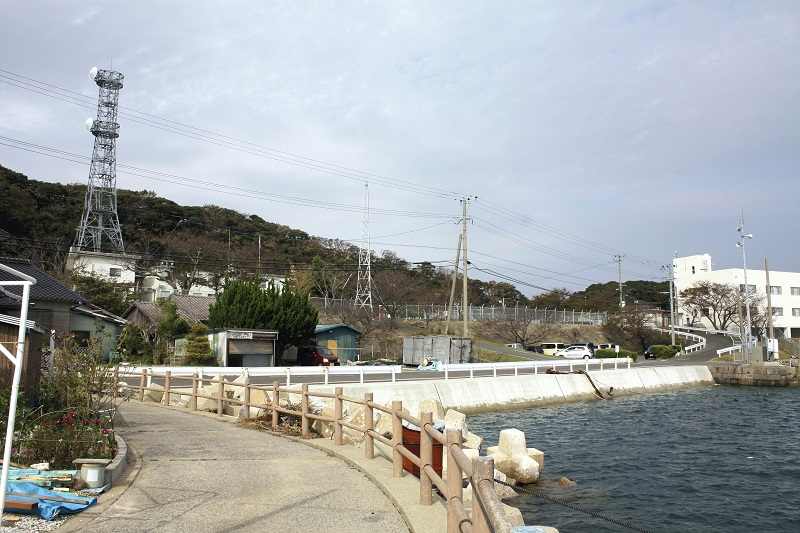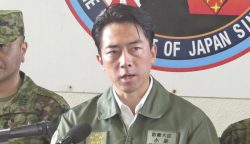
The Maritime Self-Defense Force Coastal Defense Group Tsushima headquarters, right, is seen in this photo taken in November 2013. A South Korean entity purchased a land plot nearby.
15:02 JST, June 5, 2022
TOKYO (Jiji Press) — The government has established a 30-member team, based on a new law to regulate the use of land plots viewed as important for national security, such as remote islands and areas near Self-Defense Forces bases.
The team, headed by a bureau chief-level official at the Cabinet Office, is expected to designate by year-end over 600 areas that will be subject to the regulations. The team was created after the law was partially enforced Wednesday.
There are lingering concerns that the law could lead to unnecessary restrictions on private rights and to surveillance of citizens.
The law was enacted in June last year, with support from the ruling Liberal Democratic Party and its coalition partner, Komeito, as well as some opposition forces including Nippon Ishin no Kai (Japan Innovation Party).
The partial enforcement has enabled the establishment of a council from which the government must collect opinions before designating regulated areas.
Work to designate such areas is scheduled to start after a basic policy stipulating activities to be subject to regulations is approved by the cabinet by September, when the law will be fully enforced.
Under the law, facilities of the SDF, the U.S. military and the Japan Coast Guard, as well as facilities used to support the lives of the public that will be designated under a cabinet order, will be deemed as “important facilities” for the country’s security.
It will allow the prime minister to designate areas within 1 kilometer of the important facilities, remote border islands and some other places as “monitored areas.”
The law will also enable the government to conduct investigations into residents and land owners in the monitored areas and impose penalties for “acts that impede the functions” of important facilities.
Among important facilities and remote border islands, those deemed particularly important will be designated as “special monitored areas.” Prior notifications to the government will be mandated for transactions of land plots larger than a certain size in the special monitored areas.
In parliamentary deliberations on the law, some lawmakers viewed as a problem the vagueness of the criteria for designating areas subject to regulations, details of investigations into citizens and types of activities that would be regarded as obstructive.
The leading opposition Constitutional Democratic Party of Japan and the Japanese Communist Party opposed the law, saying that the government would be able to use the law in arbitrary ways, leading to restrictions on private rights.
The focus is how clear the planned basic policy will be about these points.
As an example of obstructive activities, a government official cited the installation of a radio disturbance device that might affect SDF flight operations. But this leaves the possibility that using something like a microphone stand may also be considered an obstructive act.
In the law, many parts of the text are abstract. Various matters are to be decided under cabinet orders.
The law was created after Chinese and South Korean entities acquired real estate near SDF bases in Tomakomai, Hokkaido, and Tsushima, Nagasaki Prefecture.
Meanwhile, the law does not limit the scope of people and organizations subject to investigations and restrictions to those of foreign countries.
Top Articles in Politics
-

Japan PM Takaichi’s Cabinet Resigns en Masse
-

Sanae Takaichi Elected Prime Minister of Japan; Keeps All Cabinet Appointees from Previous Term
-

Japan’s Govt to Submit Road Map for Growth Strategy in March, PM Takaichi to Announce in Upcoming Policy Speech
-

LDP Wins Historic Landslide Victory
-

LDP Wins Landslide Victory, Secures Single-party Majority; Ruling Coalition with JIP Poised to Secure Over 300 seats (UPDATE 1)
JN ACCESS RANKING
-

Japan PM Takaichi’s Cabinet Resigns en Masse
-

Japan Institute to Use Domestic Commercial Optical Lattice Clock to Set Japan Standard Time
-

Israeli Ambassador to Japan Speaks about Japan’s Role in the Reconstruction of Gaza
-

Man Infected with Measles Reportedly Dined at Restaurant in Tokyo Station
-

Videos Plagiarized, Reposted with False Subtitles Claiming ‘Ryukyu Belongs to China’; Anti-China False Information Also Posted in Japan























